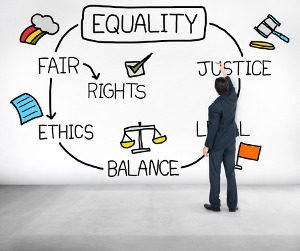 Harassment in the workplace not only affects a victim’s mental wellbeing, but can also have legal repercussions. Sexual harassment and other types of workplace intimidation are taken seriously by the justice system and can result in a citation, demotion, or termination. In some cases, a company may be held liable for harassment if it occurs on its property. Harassment is a criminal charge and if a victim chooses to press charges, the harasser could face community service, probation, or jail time. Learn more about the repercussions that harassment in the workplace can have on all parties involved.
Harassment in the workplace not only affects a victim’s mental wellbeing, but can also have legal repercussions. Sexual harassment and other types of workplace intimidation are taken seriously by the justice system and can result in a citation, demotion, or termination. In some cases, a company may be held liable for harassment if it occurs on its property. Harassment is a criminal charge and if a victim chooses to press charges, the harasser could face community service, probation, or jail time. Learn more about the repercussions that harassment in the workplace can have on all parties involved.
Types of Harassment in the Workplace
Harassment in the workplace covers a broad range of verbal and physical behaviors that violate Title VII of the Civil Rights Act of 1964, as well as other federal and state regulations. As defined by the Equal Employment Opportunity Commission, harassment is unwelcomed behaviors based on race, religion, color, sex, gender identity, age, genetic information, or a physical or mental disability. Any type of harassment in the workplace may become unlawful if the conduct acts as a prerequisite to continued employment or if the conduct is severe enough that the victim considers the workplace to be a hostile or abusive environment.
Harassment can also develop in the wake of another incident. When employees report illegal behaviors or questionable work practices or conditions, there is always a risk of retaliation. Many people avoid reporting hostile or intimidating behaviors in fear of further retaliatory actions or possible termination. However, you do not need to fear retaliation. As an employee, you have the right to work in a non-discriminatory environment and should not have to deal with retaliation or intimidating behaviors. If you do experience such issues, there is no reason you should not report it.
Know Your Legal Rights at Work
The federal Civil Rights Act of 1964 is a U.S. labor law that outlaws discrimination based on color, race, sex, religion, or national origin. Additional laws prohibit discrimination based on age (if an employer is age 40 or older), disability, or genetic information. Employees cannot discriminate in any part of the employer-employee relationship, including during the job posting, application, interview, hiring, promotions, benefits, or pay. Virginia law also bans discrimination based on a person’s marital status. Sexual harassment, which often presents as unwanted touching, sexual comments or requests for dates, is one of the most common types of harassment.
Title VII of the Civil Rights Act of 1964 states that your employer cannot harass you or subject you to an intimidating or hostile work environment based on any discriminatory factors. Congress has added to these protections with the passing of the Americans with Disabilities Act, which protects employees against discrimination based on disability and the Age Discrimination in Employment Act, which protects employers over age 40 from age discrimination. There are two main limitations on Title VII. An employer must have at least 15 employees to be subject to the law. The second limitation is related to time. An employee has 180 days to report an incident from the time of the discrimination or harassment.
In addition to Title VII, there are other civil rights laws that protect employees from harassment in the workplace. Title 42 of the United States Code prohibits a person from discrimination on the basis of race in the creation and enforcement of contracts. Fairfax County and the city of Alexandria in Virginia have their own anti-discrimination laws that cover employers with four or more employees. Contractors and subcontractors with contract for more than $10,000 with the state of Virginia are also protected from discrimination on the basis of sex, including sexual harassment, prohibited by the Fair Employment Contracting Act.
Penalties for Workplace Harassment
Employers are liable for harassment in the workplace. If an employer is found guilty of harassment or guilty of neglecting to stop or prevent harassment, an employer could face legal penalties. While accused employers are not always liable, they may face penalties decided upon by their employer. If an employer is found guilty of failing to stop sexual harassment, he or she may face one or more penalties. Penalties may include:
- Lost wages: Employers may have to make payments to cover lost wages and any benefits a victim would have earned since the date of harassment. An employer may also be responsible for covering future lost wages and benefits.
- Compensatory damages: An employer may be responsible for payments for emotional pain and anguish.
- Attorney costs and court fees
- Punitive damages: Payments made to punish an employer
Employees who admit to sexual harassment or are found to have committed harassment during an investigation may also face penalties. Employers may choose to take disciplinary action against an employee may do so in a number of ways. Most employers will base the penalty on the severity of the harassment. Penalties made against an employee may include:
- Demotion or transfer
- Suspension or termination
- Monitoring
- Salary reduction
- Reprimand or warning
- Counseling or training
Harassment is a form of discrimination that violates state and federal employment laws. However, not all conduct is considered harassment in the eyes of the law. It may be unlawful if the harassment negatively affects the performance or wellbeing of an employee. The harassment may include belittling comments, constant ridicule, teasing, or sexual come-ons. The harassment may be so severe that the employee fears going to work due to the hostile environment created by the harassers.
You should never have to endure any type of discrimination, retaliation, or harassment at work. If you have, it is important to do something about it. Failing to take action can dramatically impair your ability to take legal action against an employer or co-worker in the future. If you have been the victim of harassment in the workplace, it is important to understand your legal rights and what options you have moving forward. An experienced employment attorney can help you navigate through the justice system to ensure a fair and just resolution. Contact our office today to see how we can help you with your harassment claim.


